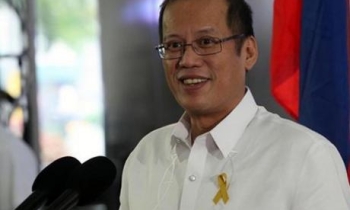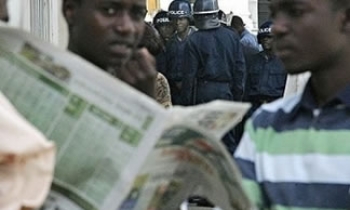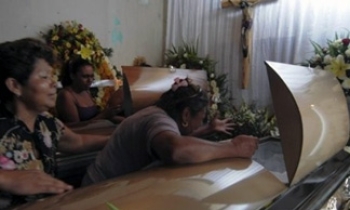AMMAN, Jordan (UPI) -- As if living in a turbulent Middle East is not hard enough. Try being a journalist, especially an Arab one, and the risks on your safety immediately shoot up.
This is how the Paris-based Reporters Without Borders described the Middle East and North Africa in its annual report released on May 3 marking the 16th World Press Freedom Day: 'The world`s most dangerous region for journalists.'
With rising violence in Iraq and the Palestinian-Israeli conflict, in addition to repressive authoritarian regimes, the risks on journalists are also rising.
The international media watchdog group said 104 media workers were attacked or threatened last year in the region, up from 73 in 2004.
Of course, the war and chaos in Iraq take the biggest credit for making the region the most risky place for journalists. The group described Iraq as the 'world`s most dangerous country for the media in 2005,' noting that 74 journalists and media assistants have been killed since the U.S.-led war on Iraq started in March 2003, 'making it the deadliest conflict for them since World War II.'
Out of 63 journalists killed worldwide last year, 24 were in Iraq, most of them while trying to do their job. Half of them were killed by U.S. soldiers, the report said.
Reporters Without Borders said six Iraqi journalists were arrested by U.S. troops and held for months without charges, legal representation or visitors.
Foreign journalists, meanwhile, have been the main targets of kidnappers, in which seven were abducted during 2005.
In Lebanon, two anti-Syrian Lebanese journalists -- managing editor of an-Nahar daily Gibran Tueni and an-Nahar columnist Samir Kassir -- were killed in separate car bombs and LBC TV star presenter May Chidiac was maimed when her car exploded.
Reporters Without Borders concludes that 'Lebanese journalists, who enjoy freedoms almost unheard of in the Arab world, now fear for their lives' as some fled abroad.
While the annual report describes the Israeli media as the 'only ones in the region that had genuine freedom to speak out,' the Israeli authorities were not allowing such freedom in the Palestinian territories they occupy.
'Israeli soldiers discriminated against Arab journalists and abuses against them, whether they worked for local media or pan-Arab TV stations, such as al-Jazeera and al-Arabiya, increased during the year. The Israeli army hounded, threatened, summoned and arrested them, sometimes without subsequent trial,' the report said.
Violent conflicts aside, the organization acknowledged the authoritarian regimes in the Arab world are making journalists targets for repression, be they through their emergency laws or restrictive press legislation.
'Heads of state, ministers, security agents and police targeted the media and its representatives throughout the year,' the group said, adding that 'self-censorship or exile is often the only solution for Arab journalists.'
Independent Arab analysts say the Arab media cannot be free so long as there is a serious absence of human rights, political, economic and social freedoms. Without democracy, the media and journalists will not be able work freely.
These restrictions perhaps explain why out of 250 Arab satellite TV stations and channels -- half of which are state-owned -- only 13 of them are serious news channels. The rest are geared towards entertainment, sports and some preaching 'moderate Islam.'
The grueling experience of the Qatar-based al-Jazeera news channel, launched in 1996, could explain why there is a shortage of Arab news networks, especially ones that would go to lengths to cover and broadcast developments across the region without fearing retaliation from governments.
Al-Jazeera, which is largely independent but supported by the host country`s rulers, has had its bureaus shut down in several Arab countries over the years, with some of its reporters arrested. Its offices in Kabul and Baghdad were bombed by U.S. forces, killing one of its Baghdad reporters, Jordanian Tarek Ayoub, while he was covering the invasion of Iraq in April 2003.
One of its star correspondents, Tayseer Alloni, was the first journalist to see al-Qaida leader Osama bin Laden after the September 11, 2001, terrorist attacks on the United States and was the only television reporter covering the first U.S. strikes on Afghanistan in October 2001 that toppled the Taliban regime.
Today, Alloni, a Spanish citizen of Syrian origin, is serving a seven-year prison term in Spain on charges of affiliation with al-Qaida, which he and his employers have categorically denied and are appealing the verdict.
Arab analysts convinced with Alloni`s innocence insist that had he not been a 'brave journalist' who risked his life to cover dangerous war stories in Afghanistan and Iraq, he would not be behind bars today.
Maybe.
But what is certain is that the more 'brave' journalists are, especially Arab journalists, the more they are at risk of being killed, kidnapped, arrested, harassed and threatened.
Unless governments and power circles begin to understand that 'brave' and 'journalist' necessarily go hand-in-hand, and unless they recognize a journalist`s job is to inform the world and provide different points of views to global events, shooting the messenger will become a norm.









